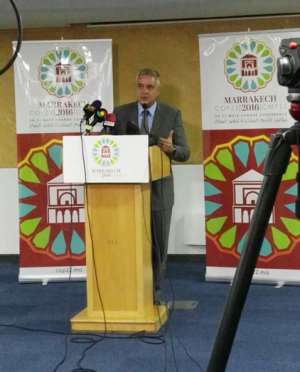
Morocco is throwing a challenge to African member states to take advantage of the Green Economy and further give major priorities to renewable energy interventions, since a huge potential exists for the whole of Africa to explore in dealing with climate change threats.
Morocco would be hosting this year's Climate Change Conference COP22 come November 2016 in the city of Marrakech, hence there is a special focus on Africa and the role of Africans in the Climate Change agenda.
According to Mr. Said Mouline, Head of Public Private Partnership for UN Climate Change COP22 2016, the big deal with renewable energy was not funds for projects but rather the lack of political will and commitment on the part of government and the private sector in general.
He said renewable energy would be given a global call for action at COP22 as members meet to make adaptations on the Paris Agreement.
"This would be the focus of a huge debate when African member states and parties to the Paris agreement COP21 meet in Morocco, Marrakech at this year's Climate Change Conference," Mr. Mouline stated.
He was addressing a representative sample of the African Press in the Moroccan Capital City Rabat at the ongoing African Press Trip in Morocco organised by the COP22 Steering Committee.
He went on to say that the Private Sector also needs to play a key role in the green economy by investing heavily in renewable energy projects.
This, he identified, would in turn create job opportunities, make diverse social impacts as well as massive economic and environmental progress.
In an interview with the press, Mr. Nizar Baraka, President of the COP22 Scientific Committee, revealed that Morocco is already at forefront of renewable energy interventions, in attempt to deal with harmful gas emissions.
"In June 2015, the Government of Morocco submitted its intended nationally determined contribution (INDC) to the UNFCCC, announcing targets of reducing its greenhouse gas (GHG) emissions by 32% by 2030 compared to business-as-usual (BAU) projected emissions and reaching over 50% of installed electricity production capacity from renewable sources by 2025. In a significant step toward these goals, the first phase of the Noor-Ouarzazate concentrated solar power (CSP) plant became operational in February 2016.
....The plant will have a 500 megawatt (MW) generating capacity and be the world's largest CSP project when the final two phases are completed in 2018. It is expected to supply electricity to 1.1 million Moroccans, increase Morocco's installed capacity of renewable energy from 22 MW in 2013 to 522 MW, a 2,272.7% increase, and cut carbon emissions by 760,000 tons per year," he disclosed.
Over US$3 billion from the African Development Bank (AfDB), the World Bank's Climate Investment Funds (CIF), other World Bank financing channels and European financing institutions helped to finance the project.
This project, according to experts will increase Morocco's energy security and contribute to low-carbon development.
Furthermore, Morocco's ambitious low-carbon growth objectives, including its renewable energy goals, contributed to the Parties' decision that Morocco should host the 2016 edition of the Climate Change Conference.
It would be recalled that Parties to the UNFCCC submitted INDCs in the lead-up to the Paris Climate Change Conference, where the Paris Agreement was adopted in December 2015.
To date, 189 countries have submitted INDCs, which will serve as the basis for Parties' contributions to the Paris Agreement, upon their acceptance, there would be ratifications or approval of the Agreement.




 SSNIT must be managed without gov’t interference – Austin Gamey
SSNIT must be managed without gov’t interference – Austin Gamey
 Ejisu by-election could go either way between NPP and independent candidate — Gl...
Ejisu by-election could go either way between NPP and independent candidate — Gl...
 We never asked ministers, DCEs to bring NPP apparatchiks for returning officer r...
We never asked ministers, DCEs to bring NPP apparatchiks for returning officer r...
 No one denigrated the commission when you appointed NDC sympathizers during your...
No one denigrated the commission when you appointed NDC sympathizers during your...
 Used cloth dealers protests over delayed Kumasi Central Market project
Used cloth dealers protests over delayed Kumasi Central Market project
 A/R: Kwadaso onion market traders refuse to relocate to new site
A/R: Kwadaso onion market traders refuse to relocate to new site
 Dumsor: Corn mill operators at Kaneshie market face financial crisis
Dumsor: Corn mill operators at Kaneshie market face financial crisis
 Jamestown fishermen seek support over destruction of canoes by Tuesday's heavy d...
Jamestown fishermen seek support over destruction of canoes by Tuesday's heavy d...
 Election 2024: EC to commence voter registration exercise on May 7
Election 2024: EC to commence voter registration exercise on May 7
 Western Region: GWL hopeful of restoration of water today in Sekondi-Takoradi
Western Region: GWL hopeful of restoration of water today in Sekondi-Takoradi
